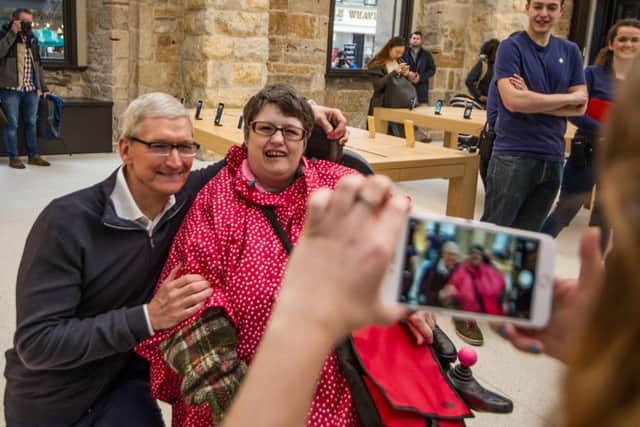Apple boss Tim Cook takes inspiration from Scottish student


Tim Cook, chief executive of Apple, met Angela Reed when he made a surprise visit to the tech giant’s flagship store in Glasgow city centre on Wednesday.
Reed, from Clydebank, was among a few dozen customers in the Buchanan Street premises when the CEO arrived at 2.30pm as part of a whistle-stop trip to Scotland.
Advertisement
Hide AdAdvertisement
Hide AdThe 45-year-old took the opportunity to thank Cook for the research Apple has pioneered to ensure its products can benefit those living with all types of disabilities.
Reed, who has difficulty communicating verbally, relies on her iPhone and tablet to write messages, as well as completing academic tasks as part of her studies.
The California-based company has invested millions in innovations such as VoiceOver, a revolutionary screen reader that lets people use an iPhone without needing to see the screen.
Its Siri programme, which is now installed in all of its smartphones, has proved particularly valuable to those with vision impairments.
It acts an intelligent personal assistant and knowledge navigator - allowing the user to control a smartphone by voice command alone.
“Our whole emphasis is on the accessibility of our products,” Cook told The Scotsman. “We design with people with disabilities in mind.
“We think everyone should be able to take advantage of technology. It shouldn’t just be for people that are lucky enough not to have disabilities.
“I loved meeting Angela, and she shared a message with me on her iPhone. It really hit home with me.”
Advertisement
Hide AdAdvertisement
Hide AdThe technology executive from Alabama, who took charge of Apple in 2011, was in Scotland to receive an honorary doctorate of science from the University of Glasgow.
He used a question-and-answer session in front of an 800-strong audience of students and academics at the city’s Bute Hall to reiterate his vision of Apple as a force for social good.
“The main thing we do is provide products to people to empower them to do great things,” he said. “We have a simple philosophy that everyone should be treated with dignity and respect. We push very hard for that.”
The accessibility features on iOS - Apple’s operating system on its smartphones and tablets - are widely regarded as the best in the industry.
“Consider someone with low vision,” technology writer Steven Aquino wrote in a blog for industry website TechCrunch.
“He or she may have struggled to use a phone with a display the size of a postage stamp, and a multi-tap keyboard. But then they buy an iPhone, and their whole world changes. They now have a phone with a touchscreen and tech like Zoom, features which make it easier to use the device.
“Suddenly, they’re texting with family and friends, looking up directions, and more with a fluidity like never before. Thus, it isn’t hyperbole to say iOS’s accessibility features have been every bit as game-changing for the disabled as the iPhone was to the mass phone market.”
Speaking to The Scotsman after her meeting with Cook, Reed said: “It was amazing to be able to tell him how much of a difference Apple makes to my life. I can do everything on my iPhone.”